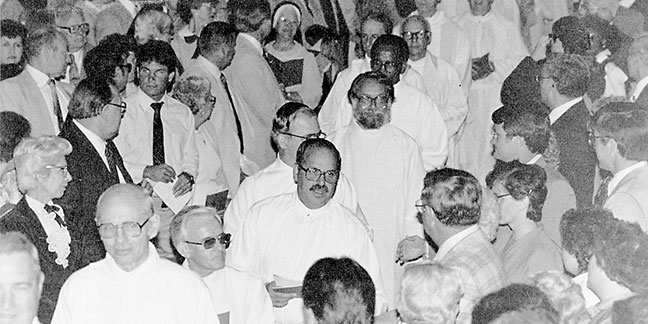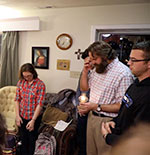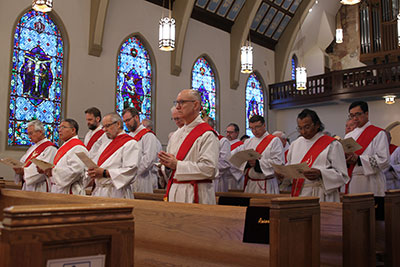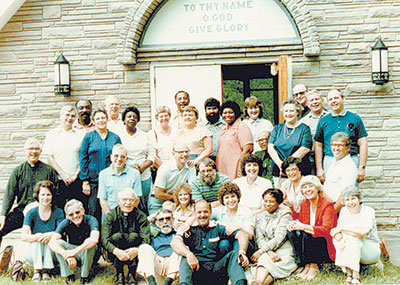39 years ago this month, the Diocese of Charlotte welcomed its first class of deacons
 The diocese’s first class of deacons was ordained by Bishop Michael Begley on May 29, 1983, during a special Mass at Ovens Auditorium in Charlotte. (Diocese of Charlotte Archives)In the late 1970s, Andy Cilone earned a promotion in the plastics industry and moved to North Carolina with his wife JoAnn and their five children, all of whom were younger than 14. They settled in Forest City, where they helped to build up the Church in many ways – most notably with him becoming one of the diocese’s first permanent deacons.
The diocese’s first class of deacons was ordained by Bishop Michael Begley on May 29, 1983, during a special Mass at Ovens Auditorium in Charlotte. (Diocese of Charlotte Archives)In the late 1970s, Andy Cilone earned a promotion in the plastics industry and moved to North Carolina with his wife JoAnn and their five children, all of whom were younger than 14. They settled in Forest City, where they helped to build up the Church in many ways – most notably with him becoming one of the diocese’s first permanent deacons.
A “cradle Catholic” who was always active in his parish, Deacon Cilone remembers the challenging transition from a highly Catholic area to the “Bible Belt” where Catholics were a minority. He wanted to know more about his faith so he could better articulate it to non-Catholics he encountered.
The Cilones quickly became active at their local parish, Immaculate Conception. When Deacon Cilone lost his job in 1979, he leaned on his faith to get him through and found another job to provide for his family within a month.
“I was so thankful,” he says. “I started with a plastics company in Shelby. There was a great feeling of thanksgiving.”
That same year, Father John Murray, then pastor of Immaculate Conception Church, approached him and asked him to consider applying for the inaugural class of permanent diaconate candidates that was being formed.
“He said, ‘Don’t worry, Andy, you can do it!’ I thought it would be a great way to enhance the knowledge of my faith, to learn more about it. Also, I was pretty involved in the Church anyway, so I went ahead and put my application in.”
And the rest, as they say, is history.
He was accepted along with 20 other candidates. For the next three years they received intense formation and training, and on May 29, 1983 – Trinity Sunday – they were ordained the diocese’s first permanent deacons.
 Pictured is Deacon Matthew Newsome leading students in prayer at Western Carolina University in Cullowhee. (Diocesan Office of the Permanent Diaconate)Deacon Cilone describes what it was like to be one of the “original” deacons ordained that day.
Pictured is Deacon Matthew Newsome leading students in prayer at Western Carolina University in Cullowhee. (Diocesan Office of the Permanent Diaconate)Deacon Cilone describes what it was like to be one of the “original” deacons ordained that day.
“It was quite a celebration. It was like a wedding,” he recalls. “With the large class we had, it was in Ovens Auditorium (in Charlotte). It was a great day. All my family came in from all parts of the country. They surprised me with my baptismal godmother from my hometown.”
Since his ordination Deacon Cilone has filled many roles at Immaculate Conception Parish, having a hand in many ministries over the years including cantoring at Mass, teaching and leading faith formation, serving in prison ministry, visiting the sick, and bringing Holy Communion to the homebound.
Reflecting on his decades of service, he says, “It has been a constant growing, learning more. You develop your ministries as you go along.”
Being a deacon is a great way to serve God and His Church, he says. “What I tell most people about what is special about the permanent deacons is that the greatest thing you do is to make a commitment to do various things in ministry...that’s the difference. You make a commitment to serve the Church.”
— SueAnn Howell, Senior reporter
History of deacons in the Diocese of Charlotte
 Deacons serve in a variety of roles across the diocese – including at parishes, college campuses, prisons and the Charlotte airport – as well as pastoral care to the sick and homebound and faith formation. Think deacons have always been part of your parish? Think again.
Deacons serve in a variety of roles across the diocese – including at parishes, college campuses, prisons and the Charlotte airport – as well as pastoral care to the sick and homebound and faith formation. Think deacons have always been part of your parish? Think again.
The diaconate is a relatively recent revival of the ancient ministry the Apostles established when they ordained Stephen and six other worthy men to assist them in caring for the needy in the early Church in Jerusalem. The word “deacon” comes from the Greek “diakonia,” which means “service.”
Over the centuries the diaconate developed as a seminarian’s step towards the priesthood rather than as an ordained ministry unto itself (one of three types of holy orders: deacon, priest and bishop). With the Second Vatican Council, however, the Church encouraged restoring the diaconate to its unique and ancient sacramental role.
“Permanent” deacons – so named to differentiate them from “transitional” deacons, who continue on the path to becoming priests – serve as ministers of the Word, the Altar and Charity. They can proclaim the Gospel, assist the priest at the altar and give homilies during Mass; they can officiate at weddings and burials, administer the sacrament of baptism and assist in distributing Holy Communion; and they engage in works of charity for their parish and the diocese.
As the Church in western North Carolina has grown over the past 50 years, the 137 deacons presently serving in the diocese have become invaluable help in our 92 parishes and missions.
But it wasn’t always this way. The diocese’s first deacons were ordained in 1983 – less than 40 years ago.
In 1968, Pope Paul VI approved the U.S. bishops’ request to revive the permanent diaconate in this country. The first deacons in the U.S. were ordained in 1971.
In Charlotte, work got underway in the spring of 1978, when the diocese’s Presbyteral Council appointed a planning committee to study the potential for a Permanent Diaconate program.
Bishop Michael Begley appointed Father Richard Burton, Father Thomas Walsh, Father Frank O’Rourke, Deacon Ted Krizman and his wife Crystal Krizman to the committee. Father Joseph Kerin served as chairperson. After the committee met for the first time on April 11, 1978, Bishop Begley expressed his wish to establish the permanent diaconate here.
Like many other dioceses, Charlotte had a lot to learn about the restored ministry and how best to set up a program, select and train candidates, and define the duties and role of deacons in the diocese. Diocesan clergy and laity worked on these issues over the next two years
 The first group of deacon candidates and their wives are pictured during a retreat in 1982 in Maggie Valley. (Diocese of Charlotte Archives)In 1980 the Permanent Diaconate program was officially established by Bishop Begley. He appointed Monsignor Anthony Kovacic, then pastor of Sacred Heart Church in Salisbury, as its first director, and Mercy Sister Mary Thomas Burke as the director of deacons’ wives.
The first group of deacon candidates and their wives are pictured during a retreat in 1982 in Maggie Valley. (Diocese of Charlotte Archives)In 1980 the Permanent Diaconate program was officially established by Bishop Begley. He appointed Monsignor Anthony Kovacic, then pastor of Sacred Heart Church in Salisbury, as its first director, and Mercy Sister Mary Thomas Burke as the director of deacons’ wives.
Twenty-two men were accepted into the inaugural class. Classes began in September 1980, with the first session being held at the now-closed Sacred Heart College in Belmont. Three years of intense preparation followed.
On May 29, 1983, Bishop Begley ordained 19 of the men before a crowd of 2,000 during a special Mass at Ovens Auditorium in Charlotte. Jim Collins and Kurt Fohn, the other two candidates, were ordained later, and they went on to be ordained as priests for the diocese.
These 21 men were the diocese’s first “ministers of service” – mature men of faith who, ordained by the laying on of hands, gave a permanent visible witness of their “yes” to God, who called them to share in the sacramental ministry of Jesus Christ by serving His Church.
Said Monsignor Kovacic in his address to the candidates at their ordination, “We look confidently to the future ... Deacons, you have your pastors and above all, with our generosity, your spirit of service and initiative you will always have abundant grace to which you are entitled by the sacrament you received.”
— SueAnn Howell and Patricia L. Guilfoyle, Catholic News Herald
More online
Read more about the history of the diocese, especially other key anniversaries in May including the founding of Catholic Social Services (now Catholic Charities) in 1973, the formation of the African American Affairs Ministry in 1985, and the conclusion of the diocese’s first Synod in 1987.
At www.faithmorepreciousthangold.com: Get updates about 50th anniversary celebrations including the Marian pilgrimage, 50 Acts of Charity, special events coming soon, and more



